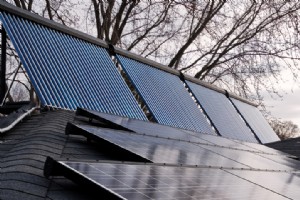Thursday, 19/02/2026 | 05:27 GMT+7
Newly installed heating and hot water systems are now required to display an energy efficiency label rating under new EU legislation.
The new regulations, which came into force on Saturday (26 September), require homeowners and businesses to label all new heating and hot water appliances with an energy rating, which can range from A+++ to G depending on the system’s efficiency. It applies to systems of up to 70kW along with combined heating, hot water, solar thermal and temperature-control systems that have a 2,000-litre tank.

Marketing opportunity
The European Commission hopes the new legislation will raise awareness of energy efficiency and drive investment in renewable technologies such as solar thermal panels. It follows previous energy efficiency label schemes for washing machines, fridges and air conditioning.
Commenting on the new scheme, Kathy McVeigh, managing director of solar hot water systems provider CoolSky and board member of the Solar Trade Association (STA), said: “The requirement for all new hot water, heating systems and storage tanks to have energy efficiency labelling is a fantastic marketing opportunity for the solar thermal industry.
“This, together with the Renewable Heat Incentive available in the UK and Northern Ireland, combine to make an excellent sales tool for the installer/builder to generate some added value on the sale of a heating system.”
Renewable Heat Incentive
Critically, the highest (A+++) energy efficiency label will only apply to systems that include renewable energy, such as solar thermal hot water heating.
Solar thermal - where panels are fitted to the roof of a house or building and sunlight is used to heat water – has become an increasingly popular choice among UK companies, with the likes of Costa, M&S and Kingspan Environmental all incorporating large solar thermal systems within the past 12 months alone.
Solar thermal panels fall under the Government’s Renewable Heat Incentive (RHI) programme, which provides financial incentives to homes and businesses that make use of renewable heat. According to Government figures, more than 11,000 applications for the non-domestic RHI were made between November 2011 and January 2015, but just 2% of those applications related to small solar thermal schemes, with the vast majority (88%) taken up by biomass boilers.
To coincide with the EU’s new labelling rules, an alliance of trade bodies, including the STA, has launched a new website with additional information on energy labelling, with a specific tool allowing professionals to generate labels for their own combination heating and water systems.
Mai Linh








 Consultation on the methodology for developing and updating energy consumption standards for four major industrial sectors
Consultation on the methodology for developing and updating energy consumption standards for four major industrial sectors
 Opening of the 2025 Energy-Efficient Equipment and Green Transition Exhibition Fair
Opening of the 2025 Energy-Efficient Equipment and Green Transition Exhibition Fair
 Energy-saving solutions and green transition promotion
Energy-saving solutions and green transition promotion
 The 9th VEPG Steering Committee Meeting: Strengthening Coordination for Viet Nam’s Just Energy Transition
The 9th VEPG Steering Committee Meeting: Strengthening Coordination for Viet Nam’s Just Energy Transition